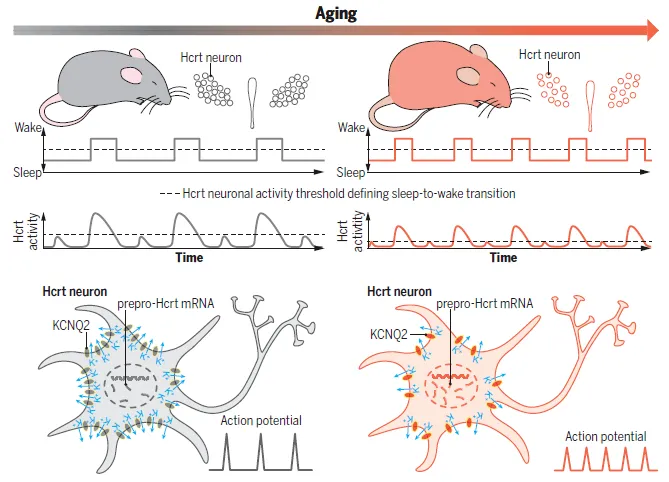Have you ever woken up after a full night of sleep, only to feel like you haven’t rested at all? Many people, especially middle-aged and older adults, experience what’s known as “fragmented sleep.” You fall asleep, but it feels like you’re awake most of the time. You wake up in the middle of the night, struggling to fall back asleep. This sleep disturbance is not just annoying; it can have serious health consequences.
The Dangers of Fragmented Sleep: Memory Loss and Rising Inflammation
Recent research has shown that long-term fragmented sleep can accelerate brain aging, impair memory, and elevate inflammation levels in the body. Fragmented sleep, where you experience interrupted periods of rest, is increasingly common and has far-reaching effects on your health.

Research screenshots
A study found that regularly experiencing fragmented sleep leads to metabolic disruptions, cognitive impairment, and an increase in systemic inflammation. In animal studies, mice exposed to fragmented sleep showed signs of glucose metabolism imbalance, cognitive dysfunction, and poor performance in tasks related to spatial learning and memory. These results suggest that the same effects could be happening in humans.
The 4 Major Risks of Fragmented Sleep:
- Cognitive Decline
Fragmented sleep can impair cognitive functions, leading to memory loss, slower reaction times, and decreased work efficiency. - Metabolic Disruption
Chronic fragmented sleep increases the risk of developing conditions like hypertension and obesity due to disrupted metabolism. - Increased Cardiovascular Risk
Fragmented sleep has been linked to an elevated risk of cardiovascular diseases, which can affect overall heart health. - Weakened Immune Function
A compromised immune system can result from fragmented sleep, increasing the likelihood of infections, chronic diseases, and even cancer.

Why Are Older Adults More Prone to Fragmented Sleep?
As people age, they tend to experience shorter, lighter sleep. In fact, fragmented sleep is a common issue among older adults, and it’s not just a human problem. Many animals also experience disrupted sleep as they age.
A 2022 study conducted by Stanford University School of Medicine revealed that neurons in the brain called “Hcrt neurons” play a key role in regulating sleep and wakefulness. As we age, these neurons become more easily triggered and overly excited, leading to fragmented sleep patterns. Researchers studied two groups of mice—one young and one old—and used light stimulation to activate specific neurons. They found that in older mice, the Hcrt neurons became hyper-excitable, leading to disrupted sleep patterns.

Research screenshots
Interestingly, when the researchers used gene-editing tools to suppress certain genes in the young mice, the result was similar to that of the older mice—they also experienced fragmented sleep. This study is still in its early stages, as it was conducted on animals, but it may provide valuable insights into human sleep disorders in the future.

Research screenshots
How to Prevent Fragmented Sleep: Tips for Better Sleep Quality
Fragmented sleep can be influenced by genetic factors, age, and underlying health conditions, but it is also strongly tied to lifestyle choices. Habits like excessive phone use, staying up late, and lack of exercise can make fragmented sleep worse. Here are some tips to help you avoid this type of sleep disturbance:
- Maintain a Regular Sleep Schedule
Try to go to bed and wake up at the same time each day. A stable biological clock can help reduce fragmented sleep.

- Avoid Screen Time Before Bed
The blue light emitted by smartphones and computers can interfere with melatonin production, the hormone responsible for sleep regulation. Avoiding screens for at least 30 minutes before bedtime can help improve sleep quality.

- Avoid Caffeine and Alcohol Before Bed
Drinking caffeinated or alcoholic beverages too close to bedtime can disrupt sleep patterns and contribute to fragmented sleep. Also, spicy foods should be avoided as they can cause discomfort and disturb your rest.

- Exercise Regularly
Moderate exercise can improve overall physical health and has been shown to help regulate sleep, reducing the chances of sleep fragmentation.

- Practice Relaxation Techniques
Reducing stress and anxiety through relaxation techniques such as meditation or deep breathing exercises can help calm your mind, making it easier to achieve a restful night’s sleep.

Conclusion :
Fragmented sleep may seem like a minor inconvenience, but its long-term effects can be far-reaching. As studies show, it can accelerate brain aging, impair memory, and increase inflammation throughout the body. Not only does it affect cognitive function, but it can also lead to serious health conditions such as metabolic disorders, cardiovascular diseases, and weakened immune function. Understanding the risks of fragmented sleep is crucial, especially for older adults. By adopting healthy sleep habits and maintaining a consistent sleep routine, it’s possible to mitigate these effects and improve overall well-being. Take control of your sleep today and protect your health for the future!



















